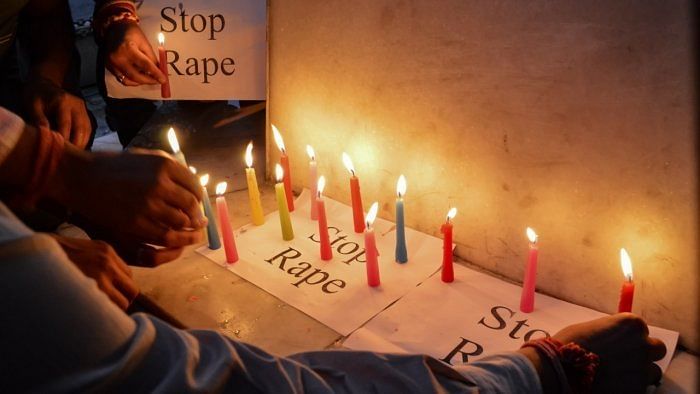
A plea has been filed before the Punjab and Haryana High Court for cancelling the 40-day parole granted to Dera Sacha Sauda chief Gurmeet Ram Rahim Singh, a rape convict. The fate of the plea is not known at the moment, but even if the godman's 'freedom' is curtailed, it will not dent his popularity.
Meanwhile, the singer-dancer-actor guru, also known as MSG, is utilising this holidaying opportunity to the hilt, addressing satsangs (literally, association with sadhus and great souls) organised in his Baghpat ashram, releasing videos of these sessions along with his new songs. Reports have it that the views of such videos are soaring while people are thronging the ashram to seek the guru's blessings.
Among the seekers, most notable are some political leaders, mostly belonging to the BJP. While the bhakt politicians seeking blessing from one or the other guru, even the controversial ones, is common in North-western India, this time it has raised eyebrows as the guru, in this case, is a rape convict,
However, though a rapist having such sway over the minds of tens of lakhs of people of Haryana, Punjab, and Himachal is shocking, it is neither inexplicable nor simply a case of ignorant fanatics hailing their cult icon. More than the cult association, it is an expression of empathy for 'our man', particularly among the less privileged.
Gurmeet Ram Rahim Singh runs hospitals and schools and organises or sponsors various social security camps, including many diagnostic facilities and sports events. He popularised Dera Sacha Sauda (literally, 'ashram for true deal') in the last two decades by serving the 'low caste' Sikhs and Hindus and standing by them to counter oppression against them.
Being a singer, dancer and actor, he is also a symbol of the aspirations of the underprivileged youth. He is an unconventional guru, an unorthodox inspirer, and a nonconformist leader who is not in politics but can still sway the political decisions of his followers.
In some recent tweets, former Bengal finance minister Amit Mitra revealed what the late Arun Jaitley had told them about Baba's political reach during the lunch break of a GST council meeting in August 2017. Jaitley said he had gone to the dera by helicopter with Navjyot Singh Sidhu, who impressed upon him that the dera's (Ram Rahim was then an accused, not convicted) blessings might help the BJP win 69 decisive assembly seats in Punjab
How far the stories of the social outreach of this man is true, or how deep it runs, is difficult to judge as much of it can be apocryphal. But the magnifying effect these stories carry helps the cult, and it is evident from reports that the Baba was invited by the United Nations to the World Toilet Day programme in 2017, even after he was convicted.
So, it all boils down to the fact that self-interest is driving the 'devotees' to stand by their icon even now. It is a sort of blind faith in the hero, and it allows the 'devotees' to exonerate him from all charges discarded as 'conspiracy'. It is as true about the political leaders as with the gurus, including Ram Rahim, who enjoys the advantage of his support base being the underprivileged.
Interestingly, the agenda of empowerment of the underprivileged allowed a lot many political forces of this country to create strong bases in certain states, the Left in Bengal being the first one. While theirs was a class-based agenda, for Lalu Prasad in Bihar, Mulayam Singh Yadav and Mayawati in UP, and Shibu Soren in Jharkhand, it was identity-based.
However, such an agenda of social justice, or any political movement based on it, was absent in many other states, including Punjab-Haryana-Himachal. Here a cult movement under Ram Rahim's Dera came up to fill the void. Therefore, icons of empowerment, such as Ram Rahim, can be put in jail but cannot be robbed of earned popularity.
The advantage of a political, social justice movement is that it allows the agenda to be formally incorporated into the system. But when it raises its head through such cult movements, it exposes the failure of the system to cater to the basics, like health or educational needs and fulfilment of the aspirational aspects of the underprivileged.
Then, ironically, the politicians who had abdicated these responsibilities throng the ashrams of the cult icon to get their support, further strengthening the cult movement. This vicious circle will continue as long as the politico-administrative system fails to hand social and economic justice to all.
(Diptendra Raychaudhuri is a journalist and author based in Kolkata)
Disclaimer: The views expressed above are the author's own. They do not necessarily reflect the views of DH.